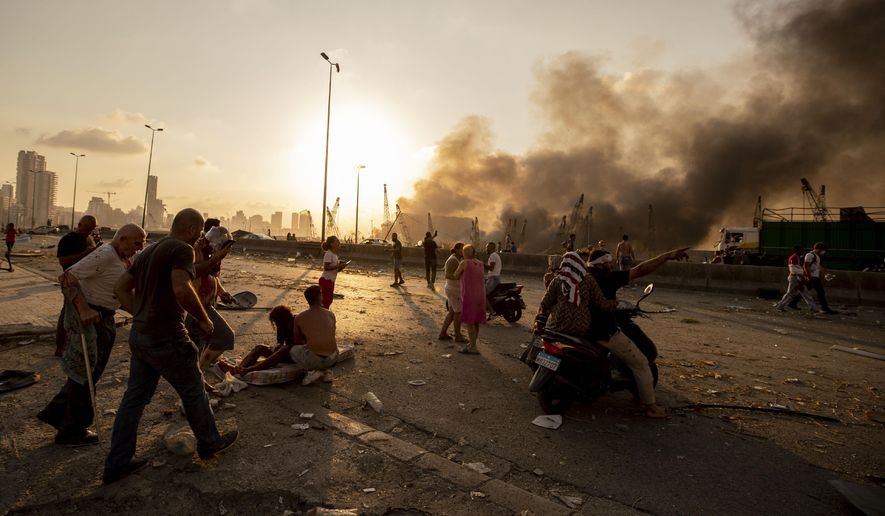OPINION:
Earlier this month, two days after a catastrophic explosion in Beirut’s port, French President Emmanuel Macron arrived on the scene, wearing a black mourning tie and a face mask, his shirt sleeves rolled up, as if he were ready to clear the rubble himself. “I’m here to help you,” he told shell-shocked survivors in the formerly elegant Gemmayze neighborhood. It’s doubtful he’ll succeed.
Long before this blast, Lebanon had begun shattering, politically and economically. Its elites bear the blame, and street protests against them have raged for almost two years.
Often not made clear in the media: It is Hezbollah, an internationally designated terrorist organization loyal to Iran’s rulers, that has been calling the shots — literally as well as figuratively. And Hezbollah is accustomed to getting away with murder — literally as well as figuratively.
An example? Rafik Hariri was one of Lebanon’s most prominent politicians. A Sunni, he was seen by Hezbollah’s Shia leaders as a rival and an irritant.
On Feb. 14, 2005, he was killed by a suicide bomber in downtown Beirut. Twenty-one bystanders perished along with him. To bring those responsible to justice, the United Nations created a Special Tribunal. It was touted as “the first tribunal of international character to prosecute terrorist crimes.” It soon had a staff of 400, including 11 full-time judges and a $60 million annual budget. Last week, this elephant gave birth to a mouse.
The tribunal convicted Salim Ayyash, a low-level Hezbollah member, of participating in a conspiracy to carry out the bombing. He was tried in absentia, and his whereabouts are unknown. Three other defendants, also Hezbollah members, were acquitted for “lack of evidence.”
Another prime suspect had been Mustafa Amine Badreddinne, believed also to have helped plan the 1983 bombings of American and French military personnel in Beirut, and American and French diplomats in Kuwait. He was killed four years ago in Syria, where, on orders from Tehran, he was leading Hezbollah’s military operations in support of the Assad dictatorship. After that, the tribunal ended investigations into his role.
In its ruling, the tribunal did note that Hezbollah had motive to “eliminate” Hariri. But prosecutors claimed they just couldn’t find the evidence needed to make a conclusive determination.
The year following Hariri’s assassination, Hezbollah precipitated a war with Israel. To halt the fighting, the U.N. Security Council unanimously passed Resolution 1701, which called for the Israel Defense Forces (IDF) to withdraw from Lebanon, and Hezbollah to be disarmed by the Lebanese Armed Forces (LAF) and the U.N. Interim Force in Lebanon (Unifil).
The IDF did as instructed. Hezbollah did not. The LAF and Unifil made no attempt to force the issue.
Since then, Hezbollah has gone on to become Lebanon’s most powerful actor. No other Lebanese political party has its own militia. Hezbollah’s militia is so strong that the LAF dares not challenge or even offend it.
Hezbollah has installed as many as 150,000 missiles, all aimed at Israel, recently adding an estimated 300 precision-guided munitions (PGMs) that may be capable of evading Israel’s Iron Dome defense system.
These missiles have been placed in homes, hospitals, schools and mosques, which means Hezbollah is using civilians as human shields in flagrant violation of international law. Hezbollah also has been attempting to dig terrorist tunnels into Israel.
With a force of more than 10,000 and a budget of half a billion dollars a year, 28% of which comes from America, Unifil has turned a blind eye.
The explosion on Aug. 4 killed nearly 200 people, injured thousands and left hundreds of thousands homeless. The dominant theory is that welders accidently ignited materials that detonated nearly 3,000 metric tons of ammonium nitrate that had been stored for six years in the port, where Hezbollah has free reign. Ammonium nitrate is useful for agriculture and terrorist bomb-making.
I’ve saved the worst for last. James Rickards, an eminent economist, this month completed a 57-page report commissioned by the Foundation for Defense of Democracies. His conclusion: “Lebanon today is broke. The entire country has been picked clean by terrorists, criminals, elites and the political class.”
More specifically, he calculates that Lebanon is $93 billion in debt, which doesn’t count the several billion needed to rebuild from the blast. Recall that in the largest bailout in world history, the International Monetary Fund (IMF) came up with $57 billion for Argentina. That was two years ago, before the global economy was crippled by a virus from China. And Argentina’s population exceeds 45 million. Lebanon’s is under 7 million.
Even if donors were to provide sufficient funds, it’s not clear how the money could be utilized. Mr. Rickards’ research reveals that Lebanon’s entire banking sector is insolvent and compromised. He calls the Banque du Liban (BdL), the central bank, “the most corrupt and incompetent central bank in the world. It is at the heart of one of the largest Ponzi schemes in history.”
Lebanon was a protectorate of France following the fall of the Ottoman Empire, and the French feel a special responsibility and affection for the long-suffering land. Last week, Mr. Macron hosted a video call from his summer retreat on the French Riviera, asking world leaders to write big checks. He reportedly raised $300 million, nowhere near enough to fill the hole Lebanon is in.
While favoring some reforms, Mr. Macron has said not a word about disarming or otherwise defanging Hezbollah. He doesn’t seem to grasp that so long as armed terrorists subservient to Iran’s revolutionary rulers are calling the shots in Lebanon, investing billions of dollars in an against-the-odds effort to save the country would be a fool’s errand.
• Clifford D. May is founder and president of the Foundation for Defense of Democracies (FDD) and a columnist for The Washington Times.




Please read our comment policy before commenting.